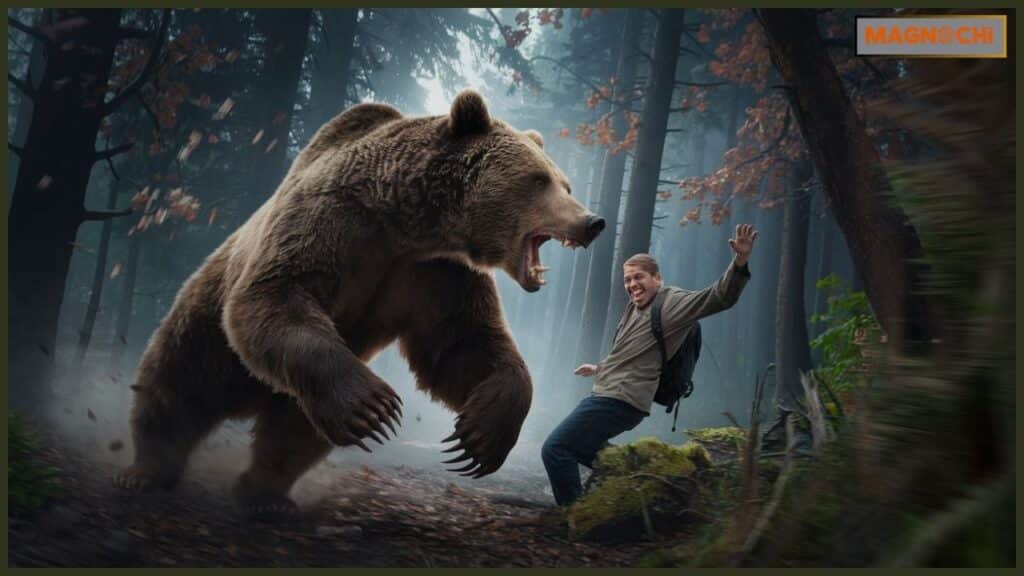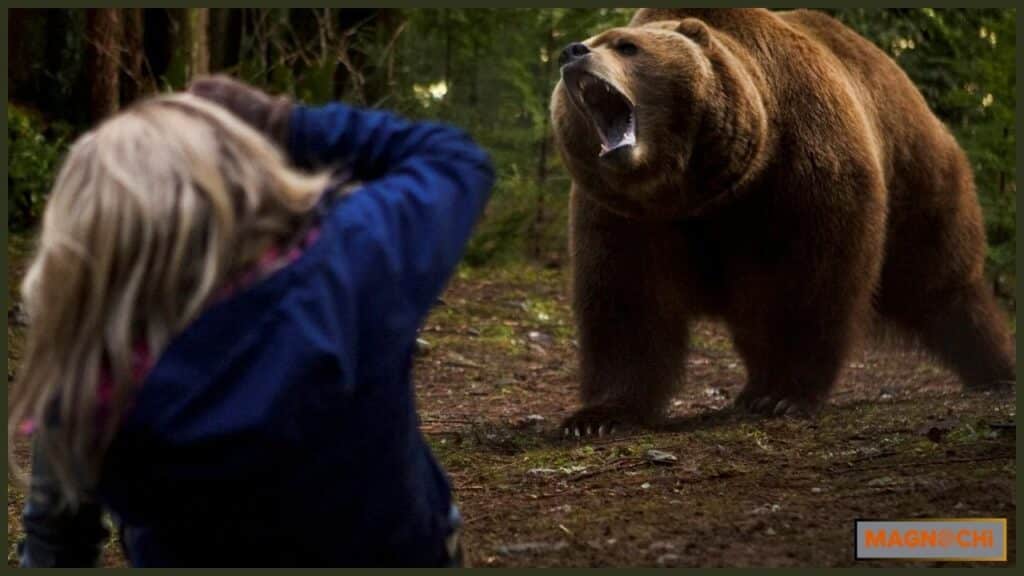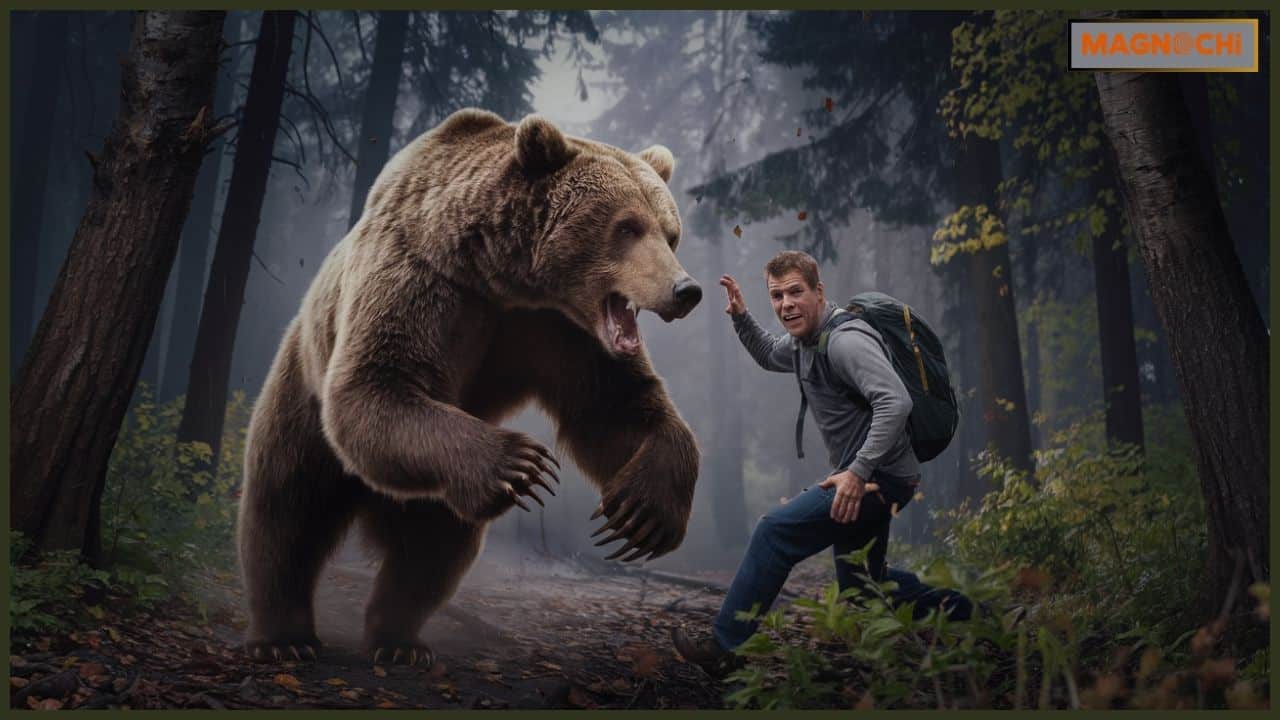Do Grizzly Bears Attack Humans? Grizzly bears, known scientifically as Ursus arctos horribilis, are one of the largest and most powerful animals on the planet.
Their presence in North America particularly in places like Alaska, Canada, and Yellowstone National Park has long been a subject of fascination and, for some, fear.
Many people worry about the possibility of a grizzly bear attack, but how often do they really occur? What causes these attacks, and how can you stay safe in bear country?
In this in-depth article, we will explore the behavior of grizzly bears, what causes attacks, and provide detailed information on how you can reduce your chances of encountering a bear while also understanding the true nature of these magnificent creatures.
So, let’s explore the facts in detail: Do grizzly bears attack humans?
What Are Grizzly Bears?
Before diving into the question of whether grizzly bears attack humans, it’s important to understand who these creatures are.
Physical Characteristics of Grizzly Bears
Grizzly bears, or Ursus arctos horribilis, are a subspecies of the brown bear, typically larger and more robust in size than other bears in the same family.
Adult males (boars) can weigh between 400 and 800 pounds, with some individuals reaching as much as 1,500 pounds in extreme cases. Females (sows) tend to be smaller, usually weighing between 300 and 600 pounds.
Grizzly bears are known for their distinctive features, which include:
- Hump on the shoulders: A pronounced muscle mass above the shoulders that helps them dig and forage.
- Long claws: Their claws, up to 4 inches in length, help them dig for food, climb trees, and catch prey.
- Large paws: Their broad paws are designed to spread their weight and help them move through soft ground or snow.
- Coarse fur: Grizzlies have thick fur that varies from light brown to nearly black. Their fur offers insulation against cold temperatures and helps them blend into the landscape.
Habitat of Grizzly Bears
Grizzly bears are primarily found in North America, with a significant population in Alaska and parts of Canada. In the United States, their range extends into Montana, Wyoming, and Idaho, particularly in Yellowstone National Park and Glacier National Park.
Grizzly bears prefer wilderness areas where they can roam freely in forests, meadows, and river valleys. These environments offer access to abundant food sources, including berries, salmon, small mammals, and larger prey such as moose or deer.
Grizzlies are also opportunistic feeders, often scavenging from carcasses left by other predators or natural causes.
Grizzly bear territories can span hundreds of miles, and these animals tend to be solitary, with the exception of mothers with cubs. They are territorial creatures, meaning that they will aggressively defend their space if they feel threatened.
Do Grizzly Bears Attack Humans?
Now that we know what grizzly bears are and where they live, let’s address the main question: Do grizzly bears attack humans?

Grizzly bear attacks on humans are rare, but they do happen. These incidents are typically not due to the bear actively hunting for humans as prey.
In fact, most grizzly bear attacks are the result of defensive behavior rather than predatory behavior.
Why Do Grizzly Bears Attack Humans?
Grizzly bears generally do not seek out humans for food. They are not natural predators of people, but they can become dangerous under certain circumstances. Below are the main reasons why a grizzly bear might attack a human:
- Defensive Behavior
Grizzly bears, particularly mothers with cubs, are known to defend themselves aggressively if they feel threatened. If you unknowingly approach a mother bear with her cubs, she may attack to protect her young. Similarly, if a bear feels that its territory or food is being encroached upon, it may respond defensively. Defensive attacks are the most common form of bear attack. - Surprise Encounters
Grizzly bears are typically solitary creatures, and they do not always notice people approaching, especially in dense forests. If a bear is surprised by a human, it may react out of fear and attack. This is most likely to happen in areas where visibility is low, such as thick forests or near rivers. - Food-Conditioned Bears
In some areas, bears become food-conditioned, meaning they have learned to associate humans with food. This happens when people leave food out in the open, whether it’s in campsites or garbage bins. Bears that associate humans with food may approach more readily and even act aggressively if they feel threatened while seeking food. - Starving or Injured Bears
Bears that are injured or starving might become more aggressive in their search for food. In these rare instances, a grizzly bear may attack a human if it perceives the person as a potential food source. However, such attacks are extremely uncommon, and most bears prefer to avoid conflict when they are healthy. - Curiosity
Bears are naturally curious creatures, and sometimes an attack can occur simply because a bear is investigating something unfamiliar. This is more likely to happen if you are near a food source, such as while fishing or camping, as the bear might be drawn to investigate.
Common Situations That Lead to Grizzly Bear Attacks
Grizzly bear attacks are generally the result of specific situations or behaviors. These attacks are not random, but rather occur in circumstances where the bear feels threatened, startled, or hungry. Below are the common scenarios in which grizzly bear attacks are most likely to happen:
- Camping and Hiking in Bear Country
One of the most common reasons for human-bear encounters occurs when people are hiking or camping in bear habitats. Grizzly bears often roam through areas where people like to camp, hike, or fish. If a bear feels threatened by human activity or if food is left out improperly, it may become aggressive. This is why it’s important to properly store food and take bear safety precautions when in bear country. - Fishing and Hunting
Many people who enjoy fishing or hunting in grizzly bear habitats may encounter a bear when they are near rivers or streams. Bears are naturally attracted to water sources where fish, like salmon, are abundant. If a person is fishing and a bear perceives them as a threat to its food source, the bear may attack. - Food-Conditioned Bears
Food-conditioned bears are those that have learned to associate humans with food. This can happen in areas where bears have access to garbage, food scraps, or even handouts from people. Food-conditioned grizzly bears are more likely to approach humans and act aggressively if they feel threatened or cornered. - Surprise Encounters in Dense Vegetation
Grizzly bears rely on their sense of smell and hearing to detect nearby threats. If a person approaches a bear without making noise or using any deterrents, they may surprise the bear, leading to an attack. This is more common in dense forests or when hiking in areas with limited visibility. - Mountain Biking in Bear Country
Mountain biking is another activity that can increase the likelihood of a grizzly bear encounter. While on a bike, it’s easy to travel quickly and silently, which may lead to a surprise encounter with a bear. The rapid movement and lack of noise can cause the bear to react aggressively out of fear.
How Often Do Grizzly Bear Attacks Occur?
While the idea of encountering a grizzly bear in the wild is unsettling, the truth is that bear attacks are extremely rare.
According to the National Park Service, there are an estimated 20-30 bear attacks per year across North America, including both grizzly and black bears. Of these attacks, a small percentage result in fatalities.
To put this into perspective, the odds of encountering a bear and being attacked are very low compared to other dangers in nature.
Many people visit grizzly bear habitats each year without experiencing any negative interactions.
Grizzly Bear Attack Statistics
Here’s a breakdown of grizzly bear attacks in popular regions:
| Location | Number of Bear Attacks (per year) | Fatalities per Year |
| Alaska | 3-5 | 0-1 |
| Yellowstone National Park | 1-2 | 0-1 |
| Glacier National Park | 1-2 | 0-1 |
| Montana | 2-4 | 0-1 |
As shown in the table, grizzly bear attacks are rare, with the frequency of attacks generally being low. Additionally, most of these incidents do not result in fatalities.
Are Grizzly Bear Attacks Dangerous?

Yes, grizzly bear attacks can be very dangerous due to the sheer size, strength, and aggression of these animals. While most attacks are defensive in nature and may involve only minor injuries, more serious attacks can result in severe injuries or death.
Common Injury Types from Bear Attacks
Grizzly bear attacks can cause a variety of injuries, ranging from mild scratches to life-threatening trauma. Common types of injuries from bear attacks include:
- Lacerations: Bears have powerful claws and sharp teeth that can inflict deep cuts and puncture wounds.
- Broken Bones: If a bear strikes a person or knocks them to the ground, it can easily cause broken bones due to the force of the attack.
- Trauma: Bears are capable of inflicting severe trauma, including head injuries and internal organ damage, due to their immense strength and size.
- Blood Loss: In severe cases, bear attacks can lead to significant blood loss, especially if arteries or veins are severed by the bear’s claws or teeth.
While fatalities are rare, grizzly bear attacks can cause long-term physical and emotional damage to survivors.
How to Avoid a Grizzly Bear Attack
Although grizzly bear attacks are rare, it is important to be prepared and take steps to avoid an encounter. Here are key survival strategies and safety tips that can help reduce the likelihood of a bear attack:
- Carry Bear Spray
Bear spray is one of the most effective tools for deterring an aggressive bear. Studies have shown that bear spray can reduce the likelihood of injury or death from a bear attack by up to 90%. Always carry bear spray in areas where grizzly bears are known to roam, and make sure it’s easily accessible. - Make Noise
When hiking, camping, or fishing in bear habitats, it’s important to make noise. Bears are more likely to avoid you if they hear you coming. Talk, clap, or use a bell to alert bears of your presence. - Travel in Groups
Bears are less likely to approach a group of people. Traveling in a group while hiking or camping can reduce the risk of an encounter. Larger groups are more noticeable and less likely to surprise a bear. - Store Food Properly
Proper food storage is critical when camping or hiking in bear country. Use bear-proof containers or hang food at least 10 feet off the ground and 4 feet away from tree trunks. Keep all food, toiletries, and scented items inside these containers to avoid attracting bears. - Stay Calm During an Encounter
If you do encounter a bear, remain calm and avoid sudden movements. Never run or scream, as this can trigger the bear’s chase instinct. Instead, back away slowly while facing the bear and speak in a calm, firm voice.
Final Verdict
Grizzly bears generally avoid human contact and will only attack if they feel threatened. Bear attacks are rare and most often occur when the bear is startled, protecting its cubs or food, or feels cornered.
By taking the proper precautions, like carrying bear spray, making noise, and properly storing food, the risk of a bear encounter can be minimized.
Remember that grizzly bears are a crucial part of the ecosystem, and respecting their habitat is key to avoiding conflict. As long as you follow bear safety guidelines and stay aware of your surroundings, the likelihood of a grizzly bear attack remains low.
FAQs
Are grizzly bears aggressive to humans?
Grizzly bears are not usually aggressive. They attack when they feel threatened or surprised. Most encounters are rare and defensive. Avoiding surprise and respecting their space reduces risk.
Which bear attacks humans the most?
Grizzly bears are responsible for more attacks on humans than black bears. However, bear attacks are very rare overall. Black bears tend to avoid humans. Grizzlies are more likely to act defensively.
Can a human survive a grizzly bear attack?
Yes, many people survive grizzly bear attacks. Survival depends on remaining calm and using bear spray. Playing dead can help prevent further aggression. Always seek medical help after an attack.
Are grizzlies more aggressive than black bears?
Yes, grizzly bears are generally more aggressive. They are more territorial and protective, especially when with cubs or food. Black bears are usually more passive and avoid humans. However, both species can be dangerous if provoked.
What is the friendliest bear?
The American black bear is considered the friendliest. They are more likely to avoid humans than grizzlies. While not dangerous by nature, they can still pose risks if threatened. Respecting their space is key to safety.
Would a tiger beat a grizzly bear?
A tiger could potentially beat a grizzly bear in a one-on-one fight. Tigers are faster and more agile. Grizzly bears are stronger and have more endurance. The outcome would depend on the situation and size of the animals.
Conclusion: Do Grizzly Bears Attack Humans?
Grizzly bear attacks on humans are rare and typically occur due to defensive behavior or surprise encounters. These attacks are usually not motivated by hunger or predation, but rather by the bear feeling threatened or cornered.
By understanding the behavior of grizzly bears and taking the proper precautions, you can significantly reduce the risk of an encounter.
Carrying bear spray, making noise, and properly storing food are all important strategies to ensure your safety when in bear country.
It’s also crucial to remember that grizzly bears play an essential role in the ecosystem, and respecting their habitat is key to maintaining a peaceful coexistence. With the right precautions and respect for wildlife, you can safely enjoy the outdoors while minimizing your chances of a bear attack.









